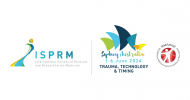Session outline
In this workshop we will explore the evidence for the timing of rehabilitation after stroke – from the perspective of brain recovery, from lived experience and from implementing processes and services that speak to these perspectives. We will explore the emerging evidence of how timing may maximise the ability of the recovering brain to undergo neuroplastic change in a positive sense. Then we will juxtapose this with the lived experience of when people feel ready to really engage with rehabilitation (and in what form) and consider the literature on un-met need. Finally, we will explore the clinical and practical implications for service delivery if we listen to these bodies of evidence. We will present case studies and trials that have investigated how to change the timing of, and access to rehabilitation.
Learning outcomes
- Understand the neurophysiological evidence for timing of rehabilitation after stroke
- Gain insight into the lived experience of when to receive (or not receive) rehabilitation and in what form
- Appreciate the evidence for receiving rehabilitation at different time periods post stroke and the impact on recovery and function for different subgroups (related to severity, latency, nature of impairments, cultural and demographic factors).
- Learn from other’s experience about implementing the evidence in clinical settings
- Begin plans to investigate and implement best practice
Target audience
- Allied health
- Medical practitioners
- Students
- Trainees
- Nursing staff
- People with lived experience and their supporters



